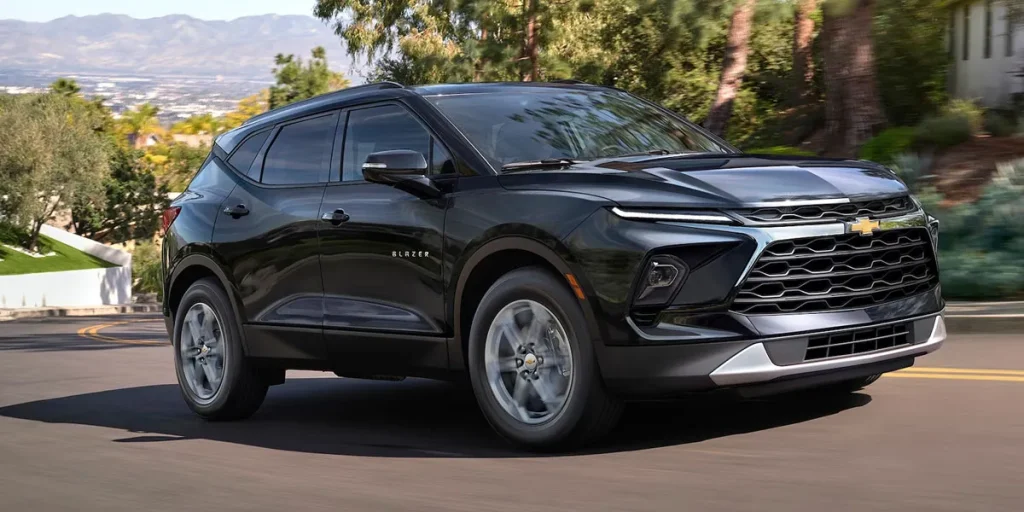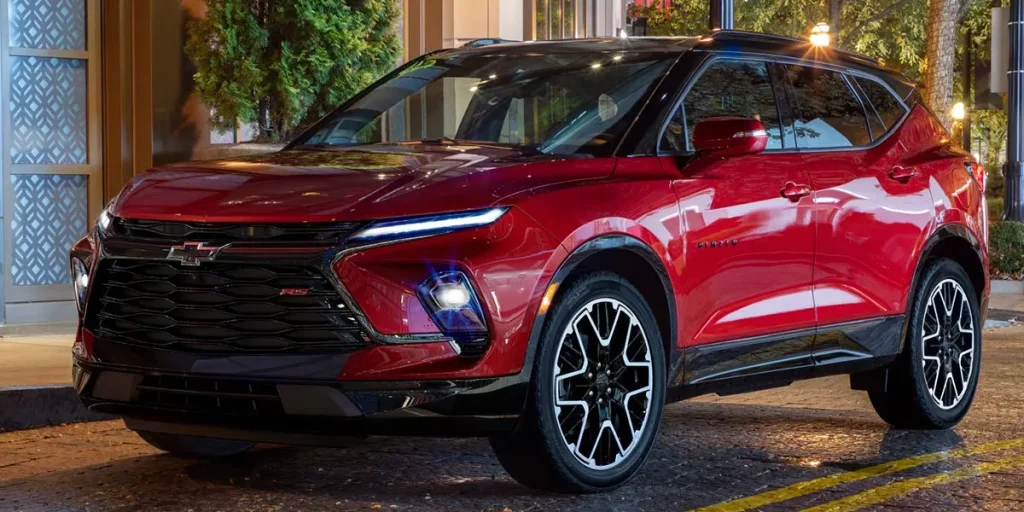A Chevy Blazer’s weight can vary, but it generally ranges from 3,810 to 4,287 pounds. The actual weight depends on the model year and configuration.
The Chevrolet Blazer is a popular mid-size SUV that combines style, performance, and versatility.
Known for its smooth ride and comfortable interior, it appeals to families and individuals alike seeking a capable vehicle for both city driving and outdoor adventures.
The model’s weight plays a crucial role in its handling, fuel efficiency, and towing capacity.
It is important to note the specific trim and features included as they can also impact the overall weight of the Blazer.
With a range of engine options and a host of modern technological integrations, the Chevy Blazer remains a competitive choice in the burgeoning SUV market.
Chevy Blazer: A Legacy Reimagined

The Chevrolet Blazer stands as an icon, blending ruggedness with elegance. With a storied past, the vehicle represents more than just a set of wheels.
It mirrors the evolution of American automotive ingenuity. The latest models bring modernity to the Blazer with innovative technology and style. Let’s explore the rebirth of a legend.
The Evolution Of The Blazer
Chevrolet’s Blazer has undergone remarkable transformations. From its birth as a rough-and-tumble SUV in 1969, the Blazer always catered to a desire for power, utility, and freedom.
Evolved through the years, it became smoother, more family-friendly, and under constant refinement. Peek into its history, and you’ll find a story of progress and adaptation.
- 1969: The K5 Blazer is born, boasting 4-wheel drive and robustness.
- 1980s: Transition to a smaller, more efficient S-10.
- 1990s: Reinvented with a sleeker design and enhanced features.
- 2000s: The Blazer takes a pause, making way for new models.
Modern Blazer: A Look At The Revival
Fast forward to the present, and the Chevy Blazer has made a thrilling return. Gone are the days of the no-frills SUV.
Instead, the modern Blazer flaunts a design that rivals luxury brands. Weight considerations are key for performance and efficiency.
Below is a glance at how much a Chevy Blazer weighs, encompassing the sleek design of today’s Blazer.
| Model | Curb Weight |
|---|---|
| 2022 Blazer L | 3,810 lbs |
| 2022 Blazer 2LT | 3,933 lbs |
| 2022 Blazer RS | 4,078 lbs |
| 2022 Blazer Premier | 4,123 lbs |
Note these figures might vary depending on the specific configurations and options chosen.
Each pound reflects engineering decisions that balance performance, comfort, and efficiency.
The Chevy Blazer’s revival is not just about bringing back a name; it’s about redefining what a mid-size SUV can be.
Blazer’s Size And Dimensions

Understanding the size and dimensions of a Chevy Blazer is crucial. It affects maneuverability, garage fit, and comfort.
Let’s explore the fundamental measurements that set the stage for the Blazer’s solid presence on the road.
Key Measurements: Length, Width, And Height
The Chevy Blazer boasts impressive dimensions. It combines sleek design with substantial size. Here are the key exterior measurements:
- Length: Ranging from 191 to 196 inches, depending on the model year.
- Width: Approximately 76 inches, providing a stable stance.
- Height: Standing about 67 inches tall for a commanding view.
Interior Space: Comfort Meets Capacity
Roomy interiors define the Chevy Blazer. It promises both comfort and capacity. Occupants enjoy generous headroom and legroom.
Cargo capacity extends from ample to expansive with seats down. Here’s a snapshot of the interior:
| Seat Rows | Headroom (inches) | Legroom (inches) | Cargo Volume (cu.ft.) |
|---|---|---|---|
| Front | 39.8 | 41.0 | 30.5 to 64.2 |
| Rear | 38.6 | 39.6 |
With rear seats folded down.
The Chevy Blazer aligns spaciousness with a cozy cabin. It is perfect for family trips or hauling gear. Each dimension is crafted to enhance the driving experience.
The Blazer’s size and dimensions truly cater to both driving pleasure and practicality.
Weight Essentials For The Chevy Blazer
The Chevy Blazer is a popular SUV known for its robust build and durability. When it comes to performance and safety, understanding its weight is crucial.
The weight impacts fuel efficiency, braking, handling, and even towing capability. Let’s explore the two primary weight categories for the Chevy Blazer.
Curbing The Scale: The Empty Weight
The empty weight, also known as curb weight, is what the Blazer tips the scales at with standard equipment, but no passengers, cargo, or additional accessories.
It is key for calculating payload and navigating weight restrictions on roads or bridges. Below are the average empty weight figures for various Blazer models:
- Blazer L: 3,810 lbs
- Blazer 1LT: 3,810 lbs
- Blazer 2LT: 3,980 lbs
- Blazer 3LT: 4,035 lbs
- Blazer RS: 4,070 lbs
- Blazer Premier: 4,123 lbs
Gross Weight: Understanding Maximum Capacity
The gross vehicle weight rating (GVWR) stands for the maximum a Blazer should weigh. This includes the vehicle itself, passengers, cargo, and any extra equipment.
Going beyond this limit can be unsafe and may also affect your Blazer’s longevity. The table below outlines the GVWR for different Blazer trims:
| Blazer Model | GVWR |
|---|---|
| Blazer L | 5,467 lbs |
| Blazer 1LT | 5,467 lbs |
| Blazer 2LT | 5,732 lbs |
| Blazer 3LT | 5,732 lbs |
| Blazer RS | 5,732 lbs |
| Blazer Premier | 5,732 lbs |
The Impact Of Weight
Understanding how the weight of a Chevy Blazer affects its performance is key for potential owners. A vehicle’s weight influences many facets of its operation.
From fuel consumption to handling, the scale of the vehicle can make a noticeable difference in both the driving experience and the cost of ownership.
Dig into how the Chevy Blazer’s pounds shape its performance on the road.
Weight Influencing Fuel Efficiency
Fuel efficiency goes hand in hand with a car’s weight. A lighter Chevy Blazer means less work for the engine, leading to better mileage. Conversely, a heavier model demands more power when accelerating, which comes at the cost of extra fuel.
Let’s break it down:
- Less weight = less energy to move
- More weight = more fuel for the same distance
This simple equation shows why car weight matters for fuel economy. Lighter models are generally friendlier on the wallet when it comes to trips to the pump.
Handling And Acceleration: How Weight Plays A Role
Quick turns and fast starts often depend on a vehicle’s weight. A Chevy Blazer’s heft affects its handling and acceleration:
| Weight | Handling | Acceleration |
|---|---|---|
| Lighter | Smoother | Quicker |
| Heavier | More resistant | Sluggish |
A nimble Chevy Blazer makes for a more responsive ride. In contrast, more weight can mean a steadier but slower response.
Drivers will note this especially when merging onto highways or navigating tight corners.
Comparing The Weight Classes: Blazer Vs. Competitors
The weight of an SUV can influence fuel efficiency, performance, and safety. The Chevy Blazer, known for its striking balance of features, also competes in a crowded market of SUVs.
Let’s delve into how it stacks up against its rivals in terms of weight.
Benchmarking Against Similar Suvs
When shopping for an SUV, weight plays a crucial role. A vehicle’s weight can affect handling and mileage. Here is how the Chevy Blazer compares to others:
| Vehicle | Weight |
|---|---|
| Chevy Blazer | 4,007 – 4,083 lbs |
| Ford Edge | 3,958 – 4,525 lbs |
| Honda Passport | 3,959 – 4,237 lbs |
| Toyota Highlander | 4,145 – 4,450 lbs |
Weight Advantages In The Suv Landscape
The Blazer’s weight is cleverly designed to be an asset. Here’s why:
- Balance: Optimal weight contributes to a smoother ride.
- Economy: Less weight can mean better fuel consumption.
- Performance: A moderate weight ensures agile handling.
The Blazer’s competitors each have their weight highlights. Yet, the Blazer maintains a competitive edge with its well-engineered balance of heft and agility for SUV enthusiasts.
Trim Levels And Their Weights
When picking out your Chevy Blazer, it’s essential to consider the different trim levels. Each offers unique features and weights.
Let’s explore the Blazer’s various trim levels and understand how they tip the scales.
From Base Model To Premium Trim: A Weight Spectrum
Your choice of trim starts with the base model and goes up to the premium trim. Each level adds more than just amenities; it also adds weight. Here are the key weight differences.
| Trim Level | Weight |
|---|---|
| Blazer L | 3,810 lbs |
| Blazer 1LT | 3,810 lbs |
| Blazer 2LT | 3,957 lbs |
| Blazer 3LT | 4,013 lbs |
| Blazer RS | 4,078 lbs |
| Blazer Premier | 4,287 lbs |
Optional Packages And Accessories: Additional Pounds
Packages and accessories enhance your Blazer but add extra weight. Here’s a quick overview of how they can affect your vehicle’s weight.
- Sun and Wheels Package: Adds roughly 50 lbs
- Hit The Road Package: Adds nearly 25 lbs
- Cargo Package: Increases by about 30 lbs
- Enhanced Convenience Package: Adds approximately 20 lbs
FAQ About the Weight of Chevy Blazer
What Is The Curb Weight Of A Chevy Blazer?
The curb weight of most Chevy Blazer models ranges from 3,810 to 4,287 pounds.
This varies by year and trim level. Accurate figures can be found in the vehicle’s manual or a trusted automotive resource.
How Does Chevy Blazer Weight Affect Fuel Efficiency?
Generally, a heavier Chevy Blazer may result in slightly lower fuel efficiency due to the increased energy required to move the mass of the vehicle.
The exact impact depends on the model’s engine, drivetrain, and other variables.
Can Weight Influence Chevy Blazer’s Handling?
Yes, the weight of a Chevy Blazer can influence its handling characteristics.
Heavier vehicles typically have a more planted feel but may exhibit more body roll and require longer braking distances compared to lighter vehicles.
What’s The Gross Vehicle Weight Rating (gvwr) For A Chevy Blazer?
The GVWR for a Chevy Blazer usually falls between 5,600 to 6,001 pounds.
It encompasses the total weight of the vehicle, passengers, cargo, and any additional equipment.
Conclusion
Understanding your Chevy Blazer’s weight is crucial for various reasons, ranging from safety to performance.
With this guide, we’ve clarified the range of weights for different Blazer models. Always check the specifics for your vehicle to ensure accuracy. Drive informed and stay safe on the roads.
Keep this info in mind for your Blazer-related needs!
Resources:
https://www.chevrolet.com/suvs/blazer
https://www.nhtsa.gov/vehicle/2023/Chevrolet/Blazer
